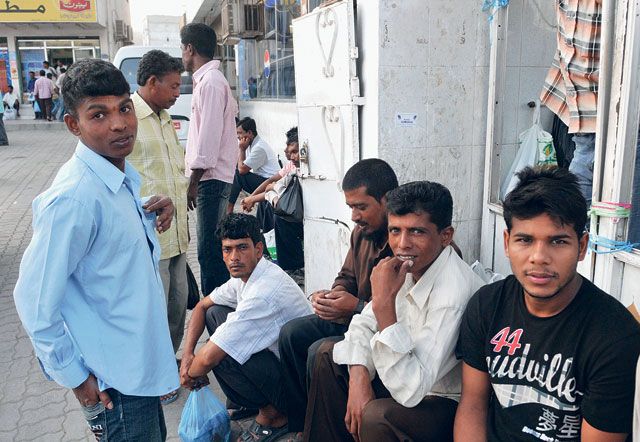Muscat: Fear gripped workers across Oman, particularly blue-collar expatriate employees, as authorities embarked on an exercise to regularise the labour market in the country.
More than 125,000 casual expatriate workers are believed to be either working in Oman on ‘Azad (free) visas' or living in the country illegally. However, they form the backbone of the construction and transport industry.
There are an estimated one million expatriates and 2.8 million Omanis in the country.
Omani sponsors provide Azad visas to expatriate workers at a fee but give neither work nor salaries. These casual workers earn their own bread and on top of that, they have to pay an annual visa charge to their respective sponsors.
So far, only employees used to be punished if they were caught working outside the jurisdiction of their job profile. However, a Royal Decree recently amended the labour law and made employers accountable.
The Ministry of Manpower has implemented the new regulations with a heavy hand over the past week. Raids were carried out at public places, offices, private organisations as well as specific dwellings where large groups of these workers reside.
"The raids have come suddenly, they should have at least forewarned and done the implementation gradually," Salman Mufti, a community welfare attaché with Pakistan Embassy in Muscat, told Gulf News.
The diplomat knows the difficulties better as a large number of Pakistani workers are engaged in infrastructure projects and in the transport industry on casual employment. "Roughly about 30 to 40 per cent of Pakistani population (around 150,000) in Oman fall under the category of casual workers," he revealed. Since the crackdown, Mufti said the number of requests from Pakistani nationals seeking to return home had more than doubled.
He also reckons that the raids have created panic and fear across society.
"The fear factor should not [get] out of hand," the Pakistani envoy said, adding that the whole exercise had also fuelled rumours.
"The rumours of thousands of workers [currently being] held is not true. We have about 300 to 400 workers in detention," he stressed.
Anil Wadhwa, the Indian ambassador to Oman, also said that the number of workers detained was not as high as rumoured. "We have around 150 people in detention," the Indian envoy said.
Loophole
He said "the amendment had plugged a major loophole in the system which was being exploited and made workers vulnerable."
He said that the Indian embassy had been given access to their citizens in detention centre. He said the mission was also ready to pay fines for workers to avoid delays in their return home.
"Not only those who do different jobs but those who employ them should also be punished," he said.
Wadhwa also hoped that the manpower ministry's decision to give a grace period till the end of December would benefit both employers as well as employees.
Expatriates from Bangladesh are believed to be the worst effected by the clampdown. However, despite repeated efforts, no one from the Bangladesh Embassy was available for comment.
Violations: Fines and sentences
- Any employer who employs non-Omani workers without permit will be slapped with a fine ranging from 1,000 Omani riyals (Dh9,541) to 2,000 riyals.
- The penalty shall be multiplied by the number of such workers who are the subject of such violation.
- In addition, the employer shall be obliged to pay the cost of repatriating the worker to their country. Such employer shall not be permitted to bring along non-Omani workers for a period not exceeding two years.
- An employer who voluntarily allows any of his workers to work with another employer shall be punished with imprisonment for a term not exceeding one month and with a fine not exceeding 1,000riyals for each worker.
- In addition, the violating Omani sponsor will not allowed to being in non-Omani workers for a period not exceeding two years.
- A non-Omani worker who works in the Sultanate without a permit from the relevant directorate, or who works with an employer other than the one who is permitted to bring him long, shall be punished with imprisonment for a term not exceeding one month or with fine not less than 400 riyals and not exceeding 800 riyals.












